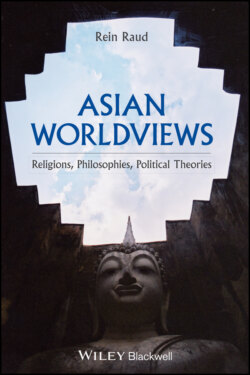Asian Worldviews

Реклама. ООО «ЛитРес», ИНН: 7719571260.
Оглавление
Rein Raud. Asian Worldviews
Table of Contents
Guide
Pages
Asian Worldviews. Religions, Philosophies, Political Theories
Preface
Acknowledgements
1 India
The Brahmanist Worldview
Reform Movements: Jains and Buddhism
The Four Noble Truths
The Development of Hinduism
Philosophical Systems
Indian Worldviews Under Muslim Rule
Modern Indian Thought
2 China
The Beginnings
Classical Chinese Thought: The Hundred Schools
From Han to Tang
From Song to Qing
From the Fall of the Empire to the Present
3 Japan
Prehistory and the Aristocratic Period
The Age of the Warriors: From Kamakura to Edo
Japanese Modernity: From Meiji to the Present
4 Korea, Tibet, and South East Asia
Korea
Tibet
Indic South East Asia
Vietnam
Further Reading
Glossary of Names and Terms
Chronological Table
Index. a
b
c
d
e
f
g
h
i
j
k
l
m
n
o
p
q
r
s
t
u
v
w
x
y
z
WILEY END USER LICENSE AGREEMENT
Отрывок из книги
Rein Raud
The worldviews described in this book influence the choices and actions of the people who currently make up about one half of the world's population. This alone is reason enough to be interested in Asia, but there is more. Having been economically handicapped for over a century by Western domination and inefficient, if not directly harmful domestic politics, Asian countries have now emerged to form the world's most quickly developing region, one that can no longer be excluded from global decision‐making. Culturally, geographically and politically, Asia is perhaps more diverse than any other part of the world. Dominated by two ancient, multilayered, and rich civilizations, India and China, this region is the home of some of the world's oldest and worthiest literary and philosophical cultures, theatrical traditions, and aesthetic systems. So undoubtedly at least some knowledge of Asian worldviews is necessary for anyone with an interest in the world beyond one's own home ground, were it for cultural history or current political and economic affairs.
.....
But we might want to go even further than that and question at the outset the very validity of the concepts ‘religion’, ‘philosophy’, and ‘ideology’ as such for a broader perspective. Most Westerners associate religion on a non‐analytical level with belief in a god, or gods, which is grounded in a certain doctrine, one normally fixed in scriptures and upheld by an institution of spiritual professionals. Religions are also exclusive and make strong claims on the identity of the individuals who profess them, often causing distrust or even open hatred between religiously defined communities. Philosophy, in turn, is a kind of rational and conceptual inquiry into the first principles of how the world is, how we are in it, and how we should reason about things, while political theories and ideologies are sets of principles on which their proponents consider the build‐up of society and its governing should be based – these principles can also be implicit and presented to the community as a sort of natural order, which nonetheless does not affect their ideological character.
All of these commonsensical assumptions are challenged to a certain degree by Asian worldviews. In fact, what is known as an Indian or Chinese religion and philosophy may not correspond to these tentative definitions at all. Quite a few so‐called religions, such as early Buddhism or Confucianism, do not speak about any supernatural agency, others, such as Shintō, do not have doctrines or scriptures. Their institutions, like the huge Buddhist monasteries of pre‐Islamic India, may appear more similar to what we call universities than to what look like monasteries from our point of view. And people can often identify with several religions at the same time in many regions of the area. Strangely enough, the term ‘religion’ is often forced on such worldviews that lack some, if not most of the characteristics many Westerners consider to be core properties of religion – such as the belief in a transcendent agency – while the label of ‘philosophy’ is being denied to sophisticated conceptual constructions because they lack some particular element that the critic considers crucial, even though there are Western thinkers, who are legitimately called philosophers and lack that same element as well.
.....